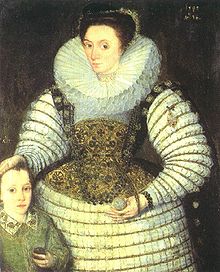Philip Sidney
Sir Philip Sidney (30 November 1554 – 17 October 1586) was an English poet, courtier, scholar and soldier who is remembered as one of the most prominent figures of the Elizabethan age.In the latter year he was elected to fill vacant seats in the Parliament of England for both Ludlow and Shrewsbury, choosing to sit for the latter, and in 1584 was MP for Kent.In the same year, he made a visit to Oxford University with Giordano Bruno, the polymath known for his cosmological theories, who subsequently dedicated two books to Sidney.Written to his mistress, Lady Penelope Rich, though dedicated to his wife, they reveal true lyric emotion couched in a language delicately archaic.Other literary contacts included membership, along with his friends and fellow poets Fulke Greville, Edward Dyer, Edmund Spenser and Gabriel Harvey, of the (possibly fictitious) "Areopagus", a humanist endeavour to classicise English verse.Both his family heritage and his personal experience (he was in Walsingham's house in Paris during the Saint Bartholomew's Day Massacre), confirmed him as a keenly militant Protestant.Already during his own lifetime, but even more after his death, he had become for many English people the very epitome of a Castiglione courtier: learned and politic, but at the same time generous, brave, and impulsive.While Sidney was traditionally depicted as a staunch and unwavering Protestant, recent biographers such as Katherine Duncan-Jones have suggested that his religious loyalties were more ambiguous.A statue of him can be found in the park at the Coehoornsingel where, in the harsh winter of 1795, English and Hanoverian soldiers were buried who had died while retreating from advancing French troops.[13] Another statue of Sidney, by Arthur George Walker, forms the centrepiece of the Old Salopians Memorial at Shrewsbury School to alumni who died serving in World War I (unveiled 1924).[15][16] An epitaph of Sir Philip Sidney: "England has his body, for she it fed; Netherlands his blood, in her defence shed; The Heavens have his soul, The Arts have his fame, The soldier his grief, The world his good name.



Philip Sidney (disambiguation)Antonis MorPenshurst PlaceZutphenOld St Paul's CathedralLondonNoble familyFrances Burke, Countess of ClanricardeSir Henry SidneyLady Mary DudleyEarly Modern EnglishElizabethan eraSonnettreatiseEnglish RenaissanceThe Countess of Pembroke's ArcadiacourtierElizabethan agesonnet sequenceAstrophil and StellaThe Defence of PoesyShrewsbury SchoolChrist Church, OxfordJohn Dudley, 1st Duke of NorthumberlandRobert Dudley, 1st Earl of LeicesterHenry Herbert, 2nd Earl of PembrokeArcadiaRobert SidneyEarl of LeicesterElizabeth IPolandKingdom of HungaryAustriaPenelope DevereuxRobert Rich, 1st Earl of WarwickAstrophel and StellaWalter Devereux, 1st Earl of EssexEdward de Vere, 17th Earl of OxfordPragueJesuitEdmund CampionRobert PeakeParliament of EnglandLudlowShrewsburyknightedAnne CecilWilliam CecilFrancesFrancis WalsinghamGiordano BrunoRoger Manners, 5th Earl of RutlandPetrarchPierre de RonsardShakespeareoctavesestetEdmund SpenserThe Shepheardes CalenderFulke GrevilleEdward DyerGabriel HarveyAreopagusSaint Bartholomew's Day MassacreJohn CasimirFlushingSir John NorrisBattle of ZutphengangreneGreat Fire of LondonCastiglioneWorshipful Company of GrocersAstrophelProtestantKatherine Duncan-JonesBenjamin WestThe Lady of MaymasqueRenaissancerhyme schemeromancepastoralHellenisticHeliodorusjoustspolitical treacherykidnappingsbattlesWilliam ShakespeareGloucesterKing LearJohn DayJames ShirleyKing Charles ISamuel RichardsonPamela; or, Virtue RewardedMary HerbertAn Apology for PoetryStephen GossonethicalThe Sidney PsalmsPsalmsArnhemPhilip Sidney, 2nd Viscount De L'IsleSidney, OhioArthur George WalkerWorld War IMonty Python's Flying Circusvice squadChamberlain, JohnHutchinson, RobertTimbs, JohnProject GutenbergFrye, NorthrupHowell, RogerWayback MachineNorth Carolina State UniversityMaley, WillySaint Louis UniversityWikisourceInternet ArchiveLibriVoxUK National ArchivesNational Portrait Gallery, LondonThe Earl of WarwickMaster-General of the Ordnance